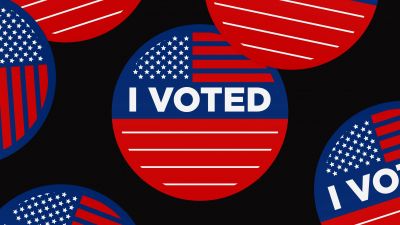
North Carolina State University students wait in line to vote in the primaries at Pullen Community Center on March 15, 2016, in Raleigh, North Carolina. (Photo by Sara D. Davis/Getty Images )
A big day for voting rights –> Important court decisions issued last Friday will impact how easily many Americans can vote in November. Ari Berman, who covers voting rights for The Nation, writes that one court’s ruling against North Carolina laws is the most influential voting-rights decision in years. Berman: “The state required strict voter ID to cast a ballot, cut a week of early voting… eliminated same-day voter registration, out-of-precinct voting and pre-registration for 16- and 17-year-olds… [T]he US Court of Appeals for the Fourth Circuit invalidated these restrictions, which it said ‘targeted African-Americans with almost surgical precision’ in violation of the Voting Rights Act and the 14th Amendment. It reversed a 485-page decision by the district court upholding the law.”
And: At Vox, Victoria Massie writes, “The federal appeals court pointed out that in the process of constructing the voter identification law, the state legislature not only requested data on the voter practices, which included race, but the changes to voting practices also seemed to use that information to target voters based on race. ‘In particular, African-Americans disproportionately used the first seven days of early voting,’ [Judge] Motz wrote. ‘After the receipt of this racial data, the General Assembly amended the bill to eliminate the first week of early voting, shortening the total early voting period from 17 to 10 days.'”
And: Another set of laws was shut down in Wisconsin. At ThinkProgress, Laurel Raymond quoted the federal judge’s decision: “‘The Wisconsin experience demonstrates that a preoccupation with mostly phantom election fraud leads to real incidents of disenfranchisement, which undermine rather than enhance confidence in elections, particularly in minority communities,’ US District Judge James Peterson wrote. In his ruling, Peterson wrote that he could not overturn Wisconsin’s entire voter ID law, unlike recent decisions in North Carolina and Texas, as a federal appeals court had already found Wisconsin’s restrictions to be constitutional. However, he ordered that the state quickly issue valid voting credentials to anyone trying to obtain free photo IDs, calling the current system for issuing IDs a ‘wretched failure’ that overwhelmingly cut out black and Hispanic citizens.”
And: In Kansas, a judge ruled that 17,500 voters “can have their votes counted in state and local races as well as federal ones in Tuesday’s Kansas primary election,” Bryan Lowry reports at The Wichita Eagle. “‘Losing one’s vote is an irreparable harm in my opinion,’ Judge Larry Hendricks said in his bench ruling Friday. A state board approved a rule earlier this month to allow people to vote only in federal elections — not state and local ones — if they registered at DMV offices but failed to provide proof of citizenship as required by Kansas law.”
But: Michael Wines at The New York Times writes that anti-voting efforts continue: “[S]ince the Supreme Court’s 5-to-4 ruling in the voting-rights case, Shelby County v. Holder, critics argue, the blatant efforts to keep minorities from voting have been supplanted by a blizzard of more subtle changes. Most conspicuous have been state efforts like voter ID laws or cutbacks in early voting periods, which critics say disproportionately affect minorities and the poor. Less apparent, but often just as contentious, have been numerous voting changes enacted in counties and towns across the South and elsewhere around the country.
“They appear as Republican legislatures and election officials in the South and elsewhere have imposed statewide restrictions on voting that could depress turnout by minorities and other Democrat-leaning groups in a crucial presidential election year.”
So you might wonder… Does Chief Justice John Roberts still believe that racism has faded away from the voting system, as he said he did back in 2013 when he wrote the majority decision gutting the Voting Rights Act? More reporting from Ari Berman, this time at Politico.
Come on, really? –> According to one poll, some Sanders-backing millennials are having trouble distringuishing between Trump and Clinton on crucial issues like climate change. Rebecca Leber for Grist: “Tom Steyer’s NextGen Climate group released polling at the Democratic National Convention last week focused on millennials in 11 battleground states, conducted by Global Strategy Group in June and early July. According to the poll, 21 percent of millennials are Bernie Sanders supporters who are so disillusioned with Clinton that they wouldn’t plan to vote for her in a general election if there are third-party candidates as well. Young voters are one of the more unpredictable factors in the 2016 election, because they’re more likely than other age groups to support Sanders and less likely to vote in general. Democrats run the risk of losing Sanders holdouts to a third-party candidate. Nearly 7 out of 10 Sanders supporters believe there’s no daylight between Trump and Clinton on the issues they care about.”
Zika now transmitted in America –> At the end of last week, the first four cases of the virus transmitted in the US — instead of being brought in from abroad — were found in Florida. At Wired, Chelsea Leu takes a look at what doctors are doing to contain the virus’ spread. She writes: “For now, the CDC hasn’t issued any travel alerts for Miami or taken any strong measures other than doubling down on its current recommendations (spray on repellent, wear long-sleeved shirts, use condoms). But Zika is a new, mysterious virus, and no one really knows if it’ll blossom into a full-blown epidemic or fizzle out in a couple summers.”
What could possibly go wrong? –> Matthew Watkins for The Texas Tribune: “After months of meetings, protests and political debates, the time has come: It’s legal to carry handguns into university buildings in Texas. The state’s new campus carry law, passed in 2015, went into effect Monday.” Watkins outlines what Texans need to know.
Clever strategy –> Oregon Public Broadcasting: “Malheur National Wildlife Refuge occupier Ryan Bundy filed a series of court motions late Thursday, declaring himself a sovereign citizen who isn’t subject to federal laws. Bundy, who is representing himself in the conspiracy case against the refuge occupiers, declares himself an ‘idiot of the “Legal Society”’ and not subject to federal law, according to the documents.
“‘I, ryan c, man, am an idiot of the “Legal Society”; and; am an idiot (layman, outsider) of the “Bar Association”; and; i am incompetent; and; am not required by any law to be competent,’ Bundy wrote in a motion filed to US District Court Judge Anna Brown.” Insert the punchline of your choice here.
Morning Reads is compiled by John Light and Michael Winship. See a story that you think should be included in Morning Reads? Tell us in the comments!
We produce this news digest every weekday. You can to receive these updates as an email newsletter each morning.



